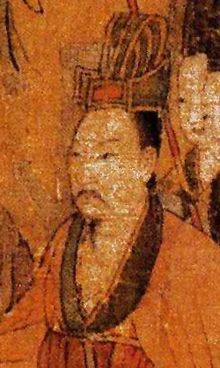Cao Zhi
| Cao Zhi 曹植 |
|||||||||
|---|---|---|---|---|---|---|---|---|---|
| Prince of Chen (more) | |||||||||

Excerpt of Cao Zhi's in Nymph of Luo River by Gu Kaizhi
|
|||||||||
| Born | 192 | ||||||||
| Died | 232 (aged 40) | ||||||||
| Spouse | Lady Cui | ||||||||
| Issue |
|
||||||||
|
|||||||||
| Father | Cao Cao | ||||||||
| Mother | Lady Bian | ||||||||
| Full name | |
|---|---|
|
Family name: Cao (曹) Given name: Zhi (植) Courtesy name: Zijian (子建) |
|
| Posthumous name | |
| Prince Si (思王) |
| Cao Zhi | |||||||||||||||||||||||||||

"Cao Zhi" in Chinese characters
|
|||||||||||||||||||||||||||
| Chinese | 曹植 | ||||||||||||||||||||||||||
|---|---|---|---|---|---|---|---|---|---|---|---|---|---|---|---|---|---|---|---|---|---|---|---|---|---|---|---|
|
|||||||||||||||||||||||||||
| Transcriptions | |
|---|---|
| Standard Mandarin | |
| Hanyu Pinyin | Cáo Zhí |
| Gwoyeu Romatzyh | Tsaur Jyr |
| Wade–Giles | Ts'ao2 Chih2 |
| IPA | [tsʰǎu̯ ʈʂɨ̌] |
| Yue: Cantonese | |
| Yale Romanization | Chòuh Jihk |
| Jyutping | Cou4 Zik6 |
| Southern Min | |
| Tâi-lô | Tsô Si̍t |
| Middle Chinese | |
| Middle Chinese | dzaw d͡ʒik |
Cao Zhi (192–232),courtesy name Zijian, was a prince of the state of Cao Wei in the Three Kingdoms period and an accomplished poet in his time. His poetry style, greatly revered during the Jin Dynasty and Southern and Northern Dynasties, came to be known as the Jian'an style. Cao Zhi was a son of Cao Cao, a warlord who rose to power towards the end of the Han Dynasty and laid the foundation of Wei. As Cao Zhi once engaged his elder brother Cao Pi in a power struggle to succeed their father, he was ostracised by his victorious brother after the latter became the emperor and established Wei. In his later life, Cao Zhi was not allowed to meddle in politics, despite his many petitions to seek office.
Born in 192, Cao Zhi was the third son of the warlord Cao Cao and Lady Bian. According to the Records of the Three Kingdoms, Cao Zhi could recite the Shi Jing, Analects and more than ten thousand verses worth of poems before he even turned twenty. His literary talent made him a favorite son of Cao Cao in the early stage of his life.
However, Cao Zhi was an impetuous man with little self-discipline. He was also a heavy drinker. On the other hand, his older brother Cao Pi was a shrewd man who knew how to feign emotions at the right times. Cao Pi also enjoyed a much closer relationship to the servants and subjects around Cao Cao, and they spoke well of him. In 217, Cao Cao eventually picked Cao Pi to succeed himself. This further aggravated Cao Zhi's already eccentric behavior. He once rode his chariot along the road reserved for the emperor and through the front gate of the palace. This infuriated his father, who sentenced the chariot driver to death.
Having chosen a successor, Cao Cao took measures to emasculate other contestants. He did this by executing Yang Xiu, a chief advisor to Cao Zhi. This greatly unsettled Cao Zhi, but failed to jolt him back to his senses. On the contrary, he sank further into his drunken habits. In 219, Cao Cao's cousin and leading general Cao Ren was besieged at the fortress at Fancheng (樊城; present-day Fancheng District, Hubei) by Guan Yu. Cao Cao named Cao Zhi to lead a relief force to the rescue, in the hope that the task would instill into the latter a sense of responsibility. However, Cao Zhi was so drunk that he could not come forth to take the order. Cao Cao then gave up on this son.
...
Wikipedia
